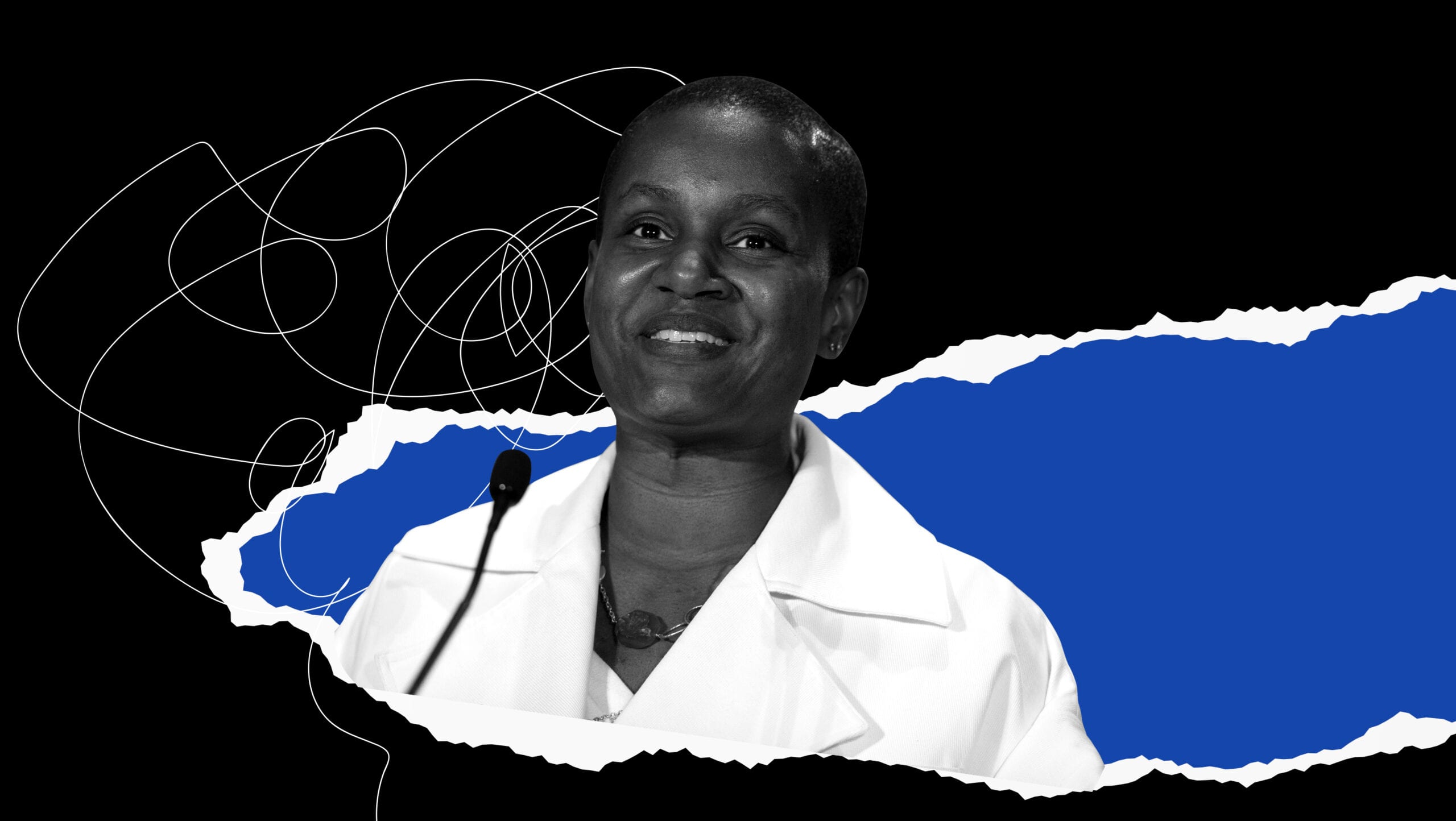Speaking with Annamie Paul, it’s clear she’s been busy. When we hop on a phone call three days after she is elected the new leader of the Green Party, she has already talked to dozens of journalists—in Canada and abroad. That’s no surprise after her historic win: She’s the first Black woman to lead a national federal party in Canada, elected during a reckoning on racism.
Paul, a Toronto-based human rights lawyer, squared off against seven other candidates to become leader of the party, emerging victorious on Oct. 3. Now, she says, her priority is developing a diverse Green Party—one that takes into account the needs of LGBTQ2 Canadians and other marginalized folks first and foremost. Before that, though, she’ll need to find a home in Parliament; she’s currently vying for a seat in the Toronto Centre by-election later this month, a riding held by former minister of finance Bill Morneau.
Xtra sat down with Paul to talk about her stance on LGBTQ2 issues, the climate emergency and where the party goes next ahead of a looming federal election.
You’re a role model for many folks in a country where our political leaders tend to be straight white men. What drove you to run for the role?
I was not considering this [role] until some people that I really respect and people who know the Green Party really well said that I should. So, if you see others in the community that you think have leadership qualities, you should tell them. You should encourage them to run and support them. It’s very hard to project yourself there—even for someone like me, after all the things that I’ve done in and around that world. When I was encouraged and told that I’d be supported, it made it seem more tangible and real and possible for me. They told me I could and I should. And I eventually agreed with them.
Something that sticks out to me about the Green Party is that it’s really strong in diversity: In the leadership race, there were multiple queer folks, a non-binary candidate and several people of colour on the ballot. And we saw the same among candidates last year in the federal election—the party boasted the second-most LGBTQ2 candidates across the country. Can you speak to why, in your opinion, the party has become home to such a diverse group of politicians and members?
In terms of candidates in the leadership race, you’re absolutely right. And that is a credit to, I think more than anything, our policies. It’s very important to me, too, as somebody who is not part of the queer community to try to reflect as much as possible what the members of our team who do come from the community have said to me. I feel like the Green Party should be the home for anyone who identifies with being part of the most progressive agenda [in Canada].
“I’m really committed to bringing the full diversity of Canada to the Green Party”
But when you look at the Green Party across the spectrum, we actually ran the least diverse slate of candidates of any of the major political parties in the last election, including the People’s Party of Canada. We have a lot of work to do on diversity. And it’s one of the things that our campaign ran on—bringing diversity to the party. That’s definitely going to be a very big part of the work that I’m going to be doing. We need to have a more intentional approach to diversifying the party and our candidates ahead of the next election.
You’re running for a seat in the Toronto Centre riding. But it’s a longtime Liberal stronghold, and the both NDP and the Liberal Party are running candidates there. What’s the case you’re making to voters in what will likely be a tough race?
First, that this race shouldn’t have happened in the first place. To be having a by-election in Toronto when we’re in the middle of a pandemic, when there has been a spike in cases, when two of the main epicentres for virus transmission are in that riding, when you know that there’s been a spike in opioid deaths in the riding, when you know that people are struggling with homelessness also because of the pandemic. Why would you call an election at this time? It is irresponsible and opportunistic, and I’m hoping the people in Toronto Centre see that and that they reject that.
I’m also hoping that they decide that they finally deserve real representation and not just another candidate parachuted in to win the seat and then head off to do whatever it is that the prime minister has decided is more important than representing them.
What are your plans if you don’t win the seat?
I’m the leader of the party now, and there is going to be a massive laundry list of things for me to do as soon as this by-election ends. We have to be election-ready at any moment. I’m really committed to bringing the full diversity of Canada to the Green Party—and that’s not just racial or ethnic diversity, but also gender identity, sexual orientation, socio-economic, regional, linguistic. That kind of outreach work takes time. So, either way, I’m going to be pretty busy come the end of October.
The Liberal government re-tabled its bill to ban conversion therapy on a national scale on Oct. 1. But there are members of the LGBTQ2 community who say it does not go far enough. Does the Green Party support the current bill?
We definitely support the bill. During the leadership race, it was one of the points that we made repeatedly: We know we’re in this pandemic, but [with] this bill, we have to make sure that we don’t lose track of it. We have to make sure that it actually gets passed.
I would say that if there are specific ways it can be improved and strengthened, we’re very interested in knowing about that. And this is why diverse representation matters within political parties; if we’re going to properly represent the interests of a community, the easiest way to do that is to have as many members of that community as possible making the decisions and writing the statements.
The Trudeau government has also vowed to end the blood donation ban, which excludes queer men and trans women from donating blood. Trudeau himself said three months ago that changes were coming to the ban. Nothing has happened yet. What’s your response to that?
Trudeau has been saying that change is coming for the entire time that he has been prime minister. There is no reason that it should be delayed. I consider the blood ban to be homophobic, to be discriminatory, to stigmatize the queer community. We want it repealed without any further delay. It’s completely unscientific. It’s not evidence-based at all. It’s a very bad public policy. And so it has to go.
One of the most pressing needs for trans and non-binary folks specifically is improved access to transition-related and gender-affirming health services. While health care falls under the purview of the provinces and territories, federal policy can really set the tone on the provincial scale. How do you think the Green Party can support trans and non-binary Canadians on this front?
“This is not just a question of climate justice, it’s also a question of social justice. You can’t have one without the other”
By providing a national platform for trans and non-binary folks to speak for themselves and to tell the government exactly what they need and what they expect, and then support them by helping to create strong public policy options. This is where it’s really important for parties like ours to offer a full commitment to their human rights. We can lend our voices. We can help to create public policy options and then push for those to be implemented. It requires us to be working in cooperation with each other.
Folks from marginalized communities are often the most affected by the climate crisis. How can we prioritize these people through the climate emergency?
I was extremely disappointed that what I didn’t hear in the Speech from the Throne [in September] was the government acknowledging that [Canada’s climate] targets are completely out of date. Not only do we have a moral obligation but we also have an international obligation because we are supposed to have adjusted our targets nationally as of this year under the Paris Climate Agreement. What we want to see is what we have always wanted to see: Real targets that correspond with science, matched by a real plan to get us there.
And this is particularly important for marginalized communities, because marginalized communities are the ones that are hurt worse and first by our failure to tackle the climate emergency. Whether that’s because we’re in the worst neighbourhoods, the biggest concrete jungles or because of environmental racism, which causes marginalized communities to be placed closer to areas of flooding, we know all around the world that it’s marginalized communities that are going to be impacted first and most profoundly. This is not just a question of climate justice, it’s also a question of social justice. You can’t have one without the other.
While the Green Party made history last election by expanding its caucus to three, it’s still a small party which often makes it tough to effect policy change. So under your leadership, what role will the Green Party play ahead of the next federal election?
Advertisement
We’ll continue to play the role that we always have: We are the vanguard of public policy. We’re the place that everyone should look—and rightly so—for the most innovative evidence-informed public policy ideas. And given the moment that we’re in and the great challenges that we’re facing—whether it’s a pandemic or the climate emergency—that’s exactly where everybody should be looking, because those are the big ideas that we’re going to need.
We are also a party that works as much as possible in a cross-partisan, co-operative, collaborative way with other parties. Having Greens that are willing to speak across party lines, that don’t have to hog all of the credit and that are willing to do quiet diplomacy allows us to have a great deal of impact, even though our caucus is relatively small. We will have more impact when we elect more Greens, but we have an outsized impact even with our three-person caucus.
This interview has been edited and condensed for clarity.


 Why you can trust Xtra
Why you can trust Xtra


